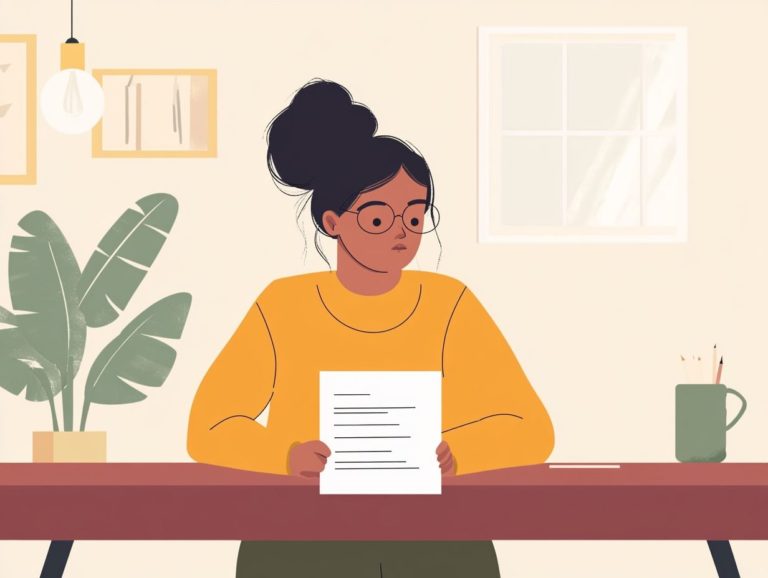5 Myths About Negotiation You Should Know
Negotiation is frequently clouded by misconceptions that can obstruct your personal and professional success. Many people mistakenly believe it’s exclusively for business dealings, while others assume it demands an aggressive demeanor or that it’s solely about driving down the price.
This article aims to dismantle five prevalent myths surrounding negotiation, illuminating its true essence and significance. You ll uncover the various types of negotiations, discover the essential skills needed for success, and learn about common pitfalls to sidestep.
By doing so, you’ll enhance your negotiation prowess and achieve more favorable outcomes.
Contents
- Key Takeaways:
- 1. Negotiation Is Only for Business Deals
- 2. The Best Negotiators Are Always Aggressive
- 3. Negotiations Are Always Win-Lose
- 4. Negotiations Are Only About Price
- 5. Good Negotiators Are Born, Not Made
- What Is Negotiation and Why Is It Important?
- Frequently Asked Questions
- What are the top five myths about negotiation?
- Is negotiation only for business professionals?
- Do you have to be a good talker to be successful in negotiation?
- Is it true that negotiation is a win-lose game?
- Do you really need to be aggressive to succeed in negotiation?
- Is negotiating a sign of weakness?
Key Takeaways:

You don t need to be aggressive to be a great negotiator; effective negotiation involves understanding and collaboration.
Negotiation can be utilized in various aspects of life, not just in business deals.
Negotiations can result in win-win outcomes if both parties are willing to compromise and find mutually beneficial solutions.
1. Negotiation Is Only for Business Deals
Negotiation isn’t just the realm of business deals; it’s a vital skill that seeps into every corner of life. From personal relationships to community interactions and conflict resolution, recognizing this reality enables you to wield your negotiation skills effectively.
Mastering this skill helps you have better conversations that promote collaboration and mutually beneficial outcomes.
With the finesse of a skilled negotiator, you can navigate a variety of situations through effective communication and the ability to understand and manage emotions. This proves that negotiation is an essential tool for everyone, not just those in the corporate world.
Take personal relationships, for example. Here, negotiation can pave the way for compromises that deepen understanding and fortify connections.
In community settings, local leaders can harness negotiation techniques to address collective needs, ensuring every voice is heard and valued. By nurturing a spirit of collaboration, you can tackle conflicts constructively, ultimately steering toward outcomes that serve all parties involved.
Whether it’s around the family table or in neighborhood initiatives, mastering negotiation fosters a harmonious atmosphere where everyone feels appreciated and are empowered to contribute.
2. The Best Negotiators Are Always Aggressive
Many people think that the best negotiators are aggressive, but the truth is that effective negotiation relies more on the ability to understand and manage emotions than on confrontation.
Successful negotiators recognize that collaboration often leads to better outcomes than a combative approach. By employing a variety of techniques, they adapt their style to fit the unique dynamics of each situation.
Building strong relationships and focusing on shared interests creates an environment where both parties feel valued, fostering trust that can lead to lasting agreements.
This strategic blend of tact and empathy allows you to handle tough discussions better, ultimately achieving common ground rather than merely winning a point.
Understanding differing perspectives enhances the potential for positive resolutions that benefit everyone involved.
3. Negotiations Are Always Win-Lose
The idea that negotiations are always about winning or losing is a widespread myth. In reality, skilled negotiators aim for win-win outcomes by leveraging smart negotiation strategies.
By embracing a mindset centered on collaboration instead of competition, you can create an environment where all parties feel valued and heard. This approach underscores the significance of understanding each participant’s unique needs and desires, often leading to innovative solutions that benefit everyone involved.
When you genuinely strive to find common ground, the outcome transcends mere compromise, resulting in a more sustainable agreement that fosters ongoing cooperation.
By integrating these insights into your everyday negotiations, you can cultivate long-lasting relationships, streamline conflict resolution, and enhance satisfaction for all parties engaged in the process.
4. Negotiations Are Only About Price

While price negotiation is undeniably a key component of many deals, reducing discussions to mere financial terms misses the wealth of objectives and creative solutions available to you. Effective negotiations can embrace various elements, such as delivery schedules, payment terms, and service agreements, all of which significantly contribute to the overall satisfaction of both parties.
It s crucial to recognize these aspects, particularly when challenges arise, like differing priorities or limited resources. By concentrating on outcomes that cater to all interests, you cultivate a more collaborative atmosphere and open the door to unconventional solutions that may offer greater long-term value.
By diving into these broader dimensions, you can craft a more balanced agreement. This paves the way for mutually beneficial results that transcend the initial price tag.
5. Good Negotiators Are Born, Not Made
The notion that great negotiators are born, not made, is a common misconception. In reality, effective negotiation skills can be learned through practice.
Through structured programs, you can learn various strategies and techniques essential for successful negotiations. Engaging in role-playing exercises allows you to simulate real-world scenarios, refining your approach and building confidence.
For example, practicing techniques like active listening or crafting win-win situations gives you the power to navigate complex discussions with greater ease. Regular assessments can help identify areas for improvement, reinforcing your learning and encouraging mastery of negotiation tactics.
As you gain experience, you ll likely find yourself sharing success stories about how your newfound skills have led to favorable outcomes, whether it s closing high-stakes deals or resolving conflicts amicably.
What Is Negotiation and Why Is It Important?
Negotiation is a strategic dialogue designed to forge agreements between two or more parties, making it an essential skill for navigating successful interactions in personal, professional, and community spheres. This dialogue unfolds through a series of thoughtfully curated steps, including preparation, discussion, and clarification of objectives, each demanding your engaged participation.
The significance of negotiation extends into countless facets of life, from everyday exchanges and conflict resolution to high-stakes business agreements. Effective communication is crucial; it allows you to articulate your needs while appreciating the perspectives of others, fostering a collaborative environment.
Ethical considerations such as fairness and integrity must guide your negotiations to ensure that agreements are established and sustainable. By embracing these principles, you enhance your ability to negotiate adeptly, paving the way for more productive collaborations and harmonious relationships.
What Are the Different Types of Negotiation?
There are various types of negotiation, each utilizing distinct strategies and techniques to secure desired results, ranging from collaborative to competitive negotiation styles. Among these, integrative negotiation stands out as a style focused on finding solutions that benefit everyone involved.
This approach fosters long-term relationships, as it emphasizes understanding each party’s interests and discovering win-win solutions. Conversely, distributive negotiation often adopts a competitive stance where one party’s gain equates to another’s loss, creating a more adversarial atmosphere.
In these scenarios, strategies like anchoring or making initial offers are vital, significantly impacting the negotiation’s trajectory. By recognizing these distinct types, you can better prepare and adapt your tactics to secure favorable outcomes across various negotiation contexts.
What Are the Key Skills for Successful Negotiation?

Successful negotiation relies on several essential skills, including the ability to understand your feelings and those of others, effective communication, and problem-solving capabilities.
These skills enhance your interactions and allow for a richer understanding of diverse perspectives.
Emotional intelligence helps you recognize and manage your own emotions while empathizing with the feelings of others, promoting balanced discussions. Effective communication ensures your messages are conveyed clearly, making both parties feel acknowledged and cultivating an atmosphere of trust.
Problem-solving skills are vital for pinpointing common ground and exploring potential solutions. Building good relationships with others lays the groundwork for collaboration rather than competition.
Together, these skills create an environment that fosters mutually beneficial agreements.
How Can One Prepare for a Negotiation?
Preparation is an essential step in the negotiation process, setting the stage for effective tactics and creating a conducive environment for discussion.
By setting clear objectives in advance, you ensure that your focus remains sharp on what you aim to achieve. It s just as important to invest time in understanding the other party’s needs, as this insight can uncover potential areas for compromise.
Adopting flexible tactical approaches allows you to adapt to shifting dynamics, fostering a cooperative atmosphere throughout the negotiation.
This solid groundwork not only boosts your confidence but also significantly enhances your chances of arriving at a mutually beneficial agreement.
What Are the Common Mistakes to Avoid in Negotiation?
Navigating the negotiation landscape can indeed be daunting, and steering clear of common mistakes is essential for fostering positive experiences.
One of the most prevalent errors is poor communication. It s easy to get caught up in your own agenda and fail to articulate your needs clearly or listen actively to the other party.
A lack of preparation can also lead to missed opportunities and less-than-ideal outcomes. Being well-informed about both sides interests can truly elevate the negotiation process.
Moreover, a fundamental misunderstanding of the other party’s perspective can result in conflicts and stagnation.
Prioritize open dialogue, invest time in preparation, and cultivate empathy to understand your counterpart s viewpoint. This approach enhances your negotiation skills and fosters deeper, more productive conversations.
How Can One Improve Their Negotiation Skills?
Take charge of your negotiation skills now! With training and practice, you can become a master negotiator.
To truly elevate your abilities, consider exploring diverse avenues, such as enrolling in specialized courses that dive deep into effective strategies and techniques.
Participating in workshops provides invaluable hands-on experiences, allowing for immersive learning, while role-playing scenarios enable you to experiment with various tactics in a supportive environment.
Actively seek constructive feedback from peers or mentors to reveal personal strengths and pinpoint areas for enhancement.
Engaging in negotiation assessments further sharpens your skills, giving you the power to approach real-world situations with heightened confidence and effectiveness.
Frequently Asked Questions

What are the top five myths about negotiation?
Myths about negotiation include the belief that it’s a win-lose game and that only aggressive people succeed. Other misconceptions are that you must be a good talker, that it’s only for business professionals, and that negotiating is a sign of weakness. To improve your approach, consider exploring 7 ways to enhance your negotiation skills.
Is negotiation only for business professionals?
No, negotiation is a skill that can be beneficial in all aspects of life, including personal relationships, buying a car or house, and even with your own children or parents.
Do you have to be a good talker to be successful in negotiation?
No. Being a good listener is often more important. Listening helps you understand the other party’s needs and concerns. This understanding can lead to a solution that benefits everyone.
Is it true that negotiation is a win-lose game?
No. Negotiation is not a competition. The aim is to find a solution that satisfies both parties.
Do you really need to be aggressive to succeed in negotiation?
No. Aggression can break down communication and create hostility. Instead, be clear and self-assured to reach a beneficial agreement.
Is negotiating a sign of weakness?
No. Negotiating shows confidence and respect for your time and resources. It’s a crucial skill that can lead to better outcomes in many areas of life.






